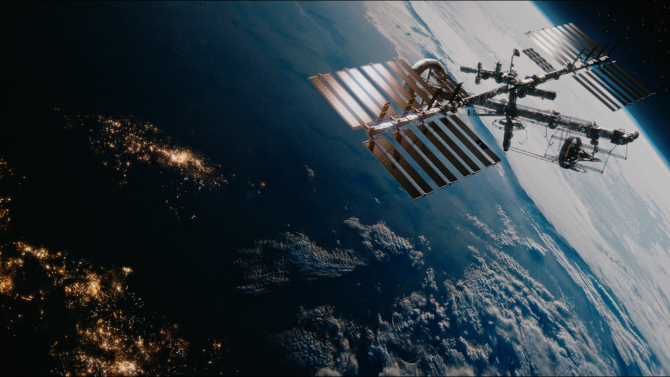
Fall Prey To
A clever reworking of the Predator franchise, 2022's Prey, a prequel co-written and directed by Dan Trachtenberg (10 Cloverfield Lane), is set some 250 years prior to what we thought was the alien species first arrival opposite human beings on Earth. Set in the vast Great Plains in 1719, the story follows Naru (Amber Midthunder), a young Comanche woman who has been trained as a healer, though not so secretly yearns to be a hunter. Overshadowed by her successful bow and arrow wielding brother Taabe (Dakota Beavers), she uses whatever free time she has to continue training at the useful skill. It is worth noting that the familial relationship is nicely crafted, not simply one of brutish sibling rivalry (like we’ve seen in other motion pictures), instead holding within it a nuanced combination of direct competition, hunting mentorship, and much needed cooperation.
-

Turning Back Time
TenetAugust 30, 2020A title with so many connotations – of course, it speaks to the fascinating time tinkering found in Christopher Nolan’s new film Tenet, but it also refers to a pre-Covid time. . . a place where people nonchalantly made the trek to movie theatres where packed crowds would communally enjoy the newest blockbusters. Whether Tenet will be able to turn back time and safely fill cinemas during this new normal is yet to be seen. A mesmeric and visually stunning spectacle that finds Nolan playing within his favourite themes, Tenet is clearly self-indulgent, yet not to its own detriment. Following up works like Memento, The Prestige, Inception, Interstellar, and, to a lesser degree, Dunkirk, Tenet, for lack of a better description, is a sort of password. . . an entry by fire into a small group of people who are attempting to prevent World War III. It is a CIA agent simply known as The Protagonist (John David Washington – BlacKkKlansman), who is introduced into this precarious, mind-bending new world.
-
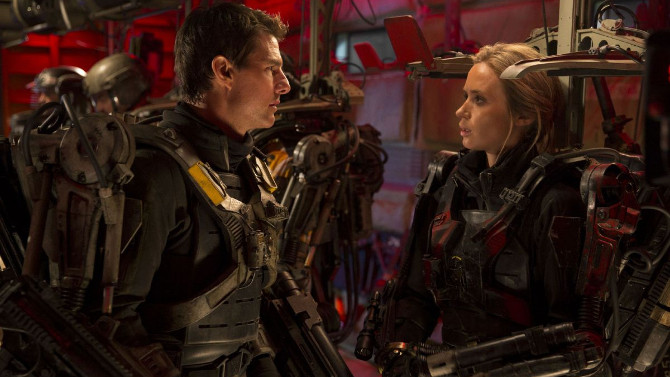
Live on the Edge
Edge of TomorrowMay 3, 2020What was once 2014's Edge of Tomorrow has somehow become known as Live Die Repeat. I’m still not exactly sure how this has happened (my guess is that it would be partly due to the fact it didn’t do very well upon its U.S. release), as you would think a title is a title. . . yet, with a simple catchy tagline (that, in essence, is a definition of the film’s narrative), it has overshadowed the original title – meaning that, by the time posters, DVD and Blu-Rays were released, the slogan featured more predominantly than the original title. . . it is rare hearing anyone even refer to it by Edge of Tomorrow anymore. A clever alien reworking of D-Day fused with a Groundhog Day premise, it brings two of Tom Cruise’s favourite people together to craft a perfect vehicle for the action superstar. Chistopher McQuarrie (who has worked with the actor seven times. . . and has three more projects in the works with him), who co-writes along with brothers Jez and John-Henry Butterworth (adapting the piece from Hiroshi Sakurazaka’s manga “All You Need Is Kill”), and director Doug Liman (who has made two recent movies with Cruise. . . and has another in the works), bring this sci-fi world to vivid life.
-

I Left My Heart in San Francisco
Time After TimeFebruary 23, 2020I know you’ve all been desperately waiting for it – my in depth retrospective on the career of Cyndi Lauper. . . alas, you will have to continue to wait. So then, you must all be wondering what exactly the above quote has to do with today’s film. The above song, Time After Time, was inspired by a movie of the same name. . . Lauper writing the hit tune soon after seeing the title in TV Guide. Adapted and directed by Nicholas Meyer (a screenwriter best known for directing two Star Trek films – yet this was his first directorial effort), and inspired by Steve Hayes and Karl Alexander’s story (the latter had a yet unfinished novel of the same name at the time), this highly original premise finds the great H.G. Wells (Malcolm McDowell – a far cry from his previous film, Caligula) living his life in the late nineteenth century while Jack the Ripper stalks his prey in the streets of London (the opening scene, featuring a lengthy single take, sets the mood – the entire film done tastefully with limited violence shown).
-
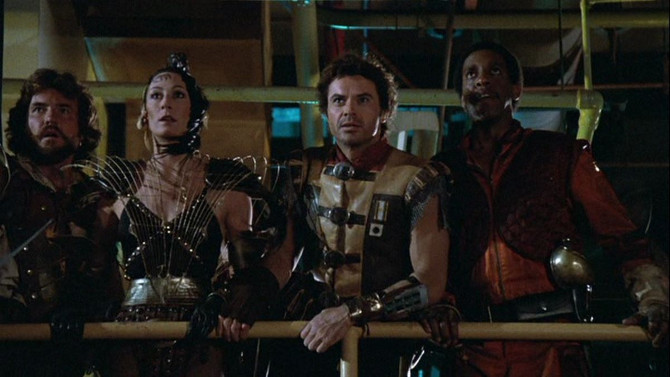
What Could Have Been: The Ice Pirates
February 19, 2020The year is 1977. . . and several movies are being hyped – none of which is Star Wars. Smokey and the Bandit, Close Encounters of the Third Kind, The Spy Who Loved Me. . . the list goes on and on, yet the George Lucas feature was not expected to go anywhere. Lucas had shown it to many of his friends (before it was even close to finished), Brian De Palma bluntly saying, “I don’t mean to sound harsh, but …what is this shit?". As the rest of his buddies concurred, the lone voice of support came from the one and only Steven Spielberg – seeing the potential and future for his friend’s creative vision. With a studio equally as unenthused – they released it on Wednesday, May 25th, in just over thirty theatres. . . Lucas decided to lick his wounds on the beaches in Hawaii. Yet, as you know, the unexpected occurred, and a little film called Star Wars became a worldwide juggernaut.
-
Sci-Fi to the Core
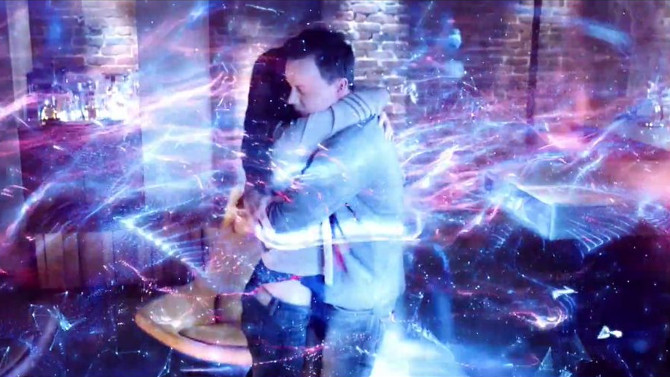 The AdeptFTLSeptember 10, 2019
The AdeptFTLSeptember 10, 2019A double feature that will only run you twenty-four minutes, writer/director Adam Stern (a visual effects guru, whose production house Artifex Studios has worked on everything from Mission to Mars and The Core, to television series, including Continuum and Wayward Pines) has developed two intriguing short sci-fi films that deal, in different ways, with discovering the unknown (and how very dangerous that can be). Feeling a little bit like entering the Twilight Zone, 2015's The Adept follows scientist couple Ben (Adam Greyson Reid) and Maddy (Jennifer Spence) as they ruminate on their most recent theoretical physics project. Before going to do the dishes, Ben wants to show Maddy his newest card trick. . . not overly interested, she continues to discuss their work. As they spitfire ideas off of each other, the multitasking Ben mysteriously makes the cards disappear – where to? – not even he is sure.
-
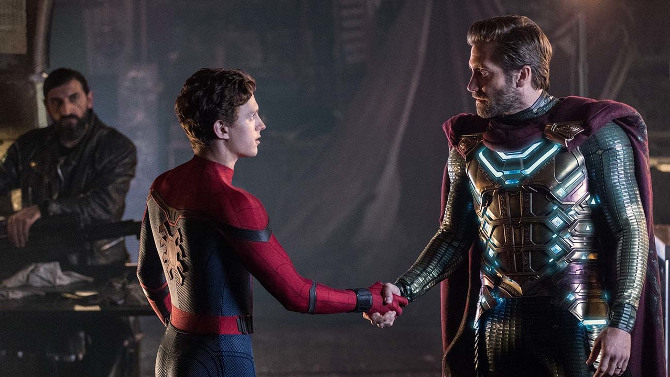
Spinning a Sequel
Spider-Man: Far from HomeJuly 12, 2019Walking a tightly strung web all the way from Queens, New York to historic Europe, Spider-Man: Far From Home has a few stumbles, but miraculously stays balanced on its epic journey. A sequel to 2017's Spider-Man: Homecoming, this 2019 adventure, which is also helmed by director Jon Watts, takes place almost immediately following the events of Avengers: Endgame (fear not, still no spoilers – though there are in this film), with Peter Parker’s Spider-Man (Tom Holland) struggling with his newfound fame (after all, he is still just a high school student). Dealing with questions like, ‘Is he an Avenger?’, or ‘What part does he play following the outcome of Endgame?’, he is like a spider in the headlights. . . looking for some much needed time off.

